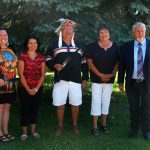Alderville chief welcomes Truth and Reconciliation report
ALDERVILLE FIRST NATION – The release of the final report from the Truth and Reconciliation Commission of Canada and its recommendations are welcomed by Alderville First Nation Chief Jim Bob Marsden – and hit very close to home.
In fact, the “first pilot” for residential schools was built in the mid-1800s and located in a building next to the current administration office in Alderville just off County Road 45, Marsden said during a recent interview. A plaque marks the spot.
They taught people how to be farmers there, Marsden said.
Children were “grabbed out of their homes” and taken away from their culture and families to attend residential schools and not allowed to use their own language. The stories of abuse are also in the government report.
“Alderville still suffers from its loss of language, Ojibwa, although longtime resident Melody Crowe has been teaching adult classes there for about the last 20 years,” Marsden said.
The report calls for the history of residential schools to be part of the school curriculum taught to all students so they will be informed about the way Aboriginal people were affected by the legacy of the residential school system.
In a recent release, provincial and territorial ministers of education expressed their “commitment to addressing the painful legacy of residential schools by ensuring that curricula… allow students to gain an understanding of how residential schools affected Aboriginal children, families, and communities and, ultimately, the country as a whole.”
With the public work done by the Commission, Canadians at large got to hear what really happened, local MP Kim Rudd said in a interview Tuesday.
“They were astounded” at what went on inside residential schools, she said, adding it is part of our history that didn’t end all that long ago. Some schools were not closed until into the 1970s, she said.
Things were done in isolation then that might not have happened if today’s communications technologies were in place.
The report, and putting the residential school history into the curriculum, is a way for everyone to understand through better awareness of our collective past, Rudd said.
From a cultural perspective, Rudd said just as she is renewing her French language, she has started to learn Ojibwa phrases and is encouraging others to, as well.
valerie.macdonald@sunmedia.ca








